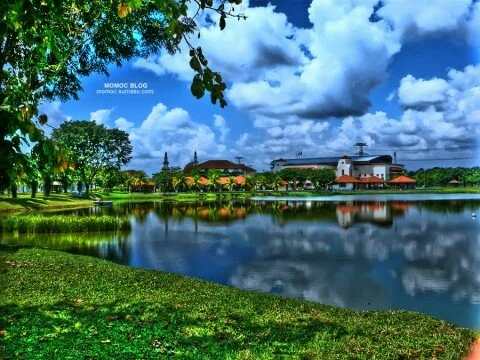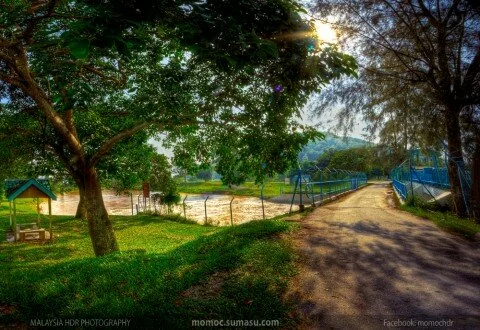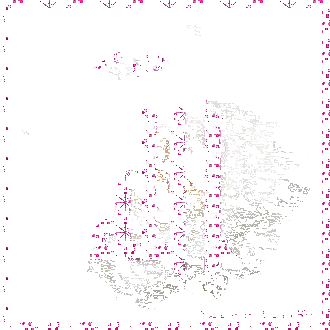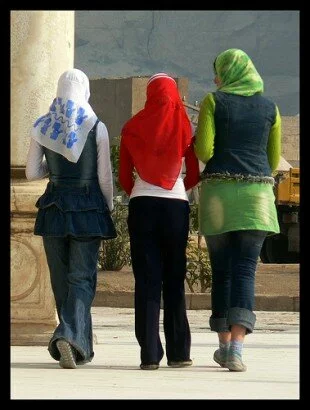
When Saudi Arabia convened an extraordinary meeting of the foreign ministers of the Organization of the Islamic Conference (OIC) states in Makkah in 1974 to discuss the establishment of a development bank to serve the needs of the Muslim world, none of the delegates could have envisaged the strides the subsequent Islamic Development Bank, which was set up in the following year in 1975, has made in a mere 35 years.
During that time, while the core objectives have remained largely intact, they have been expanded to take into consideration the realities of today’s globalized world and the inherent economic and developmental challenges and risks that the bank’s 56 member states are faced with.
Contrary to popular perception, Saudi Arabia is a largish user of IDB funds.
Cumulative allocations to Saudi Arabia by the IDB over the period 1976 to end 2009 amounted to $4.221 billion, comprising $2.77 billion for trade finance operations and $1.447 billion for project financing, with the rest made up of technical assistance and special financing.
According to Moody’s Investors Services report on the IDB in 2010, the bank’s country exposure to Saudi Arabia in 2009 represented six percent of its total equity, which was only bettered by Morocco with 12.5 percent and Iran with 7.7 percent.
The Kingdom has the largest level of intra-Islamic exports totaling $41.47 billion and the seventh largest intra-Islamic imports at $15.82 billion at end 2008 respectively.
Cumulatively, the Kingdom’s intra-Islamic trade for the year totaled $57.29 billion, the second highest after Turkey with $61.75 billion.
Despite this, it remains a moot point whether Saudi companies and entities have leveraged Riyadh’s equity membership and financial underwriting of the IDB Group to the full.
In May this year, Waleed Al-Wohaib, CEO of The International Islamic Trade Finance Corporation (ITFC), the dedicated trade finance entity of the IDB Group, at a workshop with the Jeddah Chamber of Commerce and Industry (JCCI) urged the Saudi private sector to utilize and take advantage of the corporation’s trade financing programs. Because of their lack of awareness and knowledge about Islamic trade finance products, Saudi exporters like many of their counterparts in IDB member countries, have found it difficult to access the funding programs of entities such as the ITFC.
Adnan Mandoura, secretary-general of the JCCI, emphasized at the workshop that the two parties are working toward improving market information, which will help facilitate greater trade financing between the ITFC and Saudi clients.
The ITFC, he revealed, is currently implementing 11 major trade finance operations in favor of Saudi Arabia.
Another important development is the increasing cooperation between ITFC and the Saudi Export Program (SEP), which is part of the Saudi Development Fund, especially in third countries and which helps inter alia to promote Saudi exports to OIC member countries.
In Egypt for instance ITFC and SEP jointly financed a $100m syndicated murabaha trade finance transaction in 2010 to finance the import of petroleum products from Saudi Arabia by the Egyptian General Petroleum Corporation (EGPC).
Ahmed Al-Ghanam, general manager, SEP, at the time expressed his confidence that the above transaction had “translated our MoU (signed in 2009) into a concrete $100 million trade finance operation, and also signals a key landmark operation that aims to contribute to the growth of Saudi exports to Egypt on the one hand and also to help further develop intra-trade complementarities between Saudi Arabia and Egypt.”
SEP has similar programs in place with several IDB member countries.
Similarly, the other two standalone IDB entities, the Islamic Corporation for the Development of the Private Sector (ICD) and the Islamic Corporation for Insurance of Export Credit and Investment (ICIEC) are also well involved in financing private sector initiatives in the Kingdom and providing export credit and political risk insurance to Saudi entities and investors, although the potential is much greater than current volumes of business.
ICIEC’s highly successful Documentary Credit Insurance Policy (DCIP), which it issues to confirming banks in exporting countries, according to Abdul Rahman Taha, CEO of ICIEC, “enables such banks in say Saudi Arabia, Malaysia and Turkey to accept letters of credit (LCs) from countries that are considered high risk, or from banks that are not normally accepted, or accepted but they have small limits.”
ICIEC is now aggressively marketing this product and the potential for the volumes generated are huge.
Last year, with one Saudi Arabian bank alone the corporation did close to $500 million of business through this product because the bank in question was confirming LCs from oil importing countries.
In May 2011, ICIEC issued its latest DCIP to The Saudi British Bank (SABB) in Riyadh that provides the bank with coverage for LCs confirmed by it.
This, says ICIEC, will enable SABB to increase its capacity for LCs issued by foreign banks while helping it to effectively manage some of its international bank risks.
ICIEC is bullish about Saudi economic prospects going forward. Saudi Arabia, says Hussein Jama, head, country risk analysis, ICIEC, has succeeded in sailing through the current political turmoil in the Middle East.
“The government is dealing with the elevated level of unemployment seriously, and the positive economic prospects will dent it. There are strong reasons to believe that these efforts will continue in the foreseeable future. Indeed, this will definitely augur well for the prospects of the corporation as well as its member countries,” he added.
The ICD, at the same time, has even got a more ambitious strategy for its activities in Saudi Arabia.
Last year, it established Ewan Global Residential Real Estate Company, whose shareholders include ICD, the Saudi Public Pension Fund and Saudi Economic Development Company (Sedco).
It also established Anfaal Capital, which has an investment management license from the Capital Markets Authority (CMA) in Saudi Arabia.
Anfaal’s mandate comprises three core areas – to finance the development of real estate and affordable housing projects, initially in the Kingdom and later in other countries; to finance small-and-medium-sized enterprises (SMEs) in the Kingdom and beyond; and to act as an investment bridge between Saudi Arabia and Southeast Asia especially Malaysia, Indonesia and beyond.
Not surprisingly, its shareholders are equally diverse including ICD (37 percent of the equity), Malaysia’s Maybank Investment Bank (18 percent) which will also provide the technical support, Ewan Global Residential Real Estate Company (18 percent) and Sedco (18 percent) and International Islamic Bank (IIB) Bahrain (9 percent).
Last year, the ICD also signed an agreement with Capitas of the US to set up a dedicated Islamic mortgage finance company with the shareholders including ICD, Capitas and Saudi Public Investment Fund and which will be capitalized at SR2 billion.
Khaled Al-Aboodi, the CEO of ICD, has been keen for the corporation to contribute to the real estate sector in the Kingdom, partly to leverage the huge demand for affordable housing due to the dearth of housing units and partly to capitalize on an attractive investment opportunity that shows potentially good returns.
In this respect, the corporation has also launched the ICD Middle Income Housing Development Corporation.
“The ICD mandate is to support the economic development of its member countries through the provision of finance to private sector projects on a Shariah-compliant basis. In fact, we have four good opportunities in the pipeline which could result in SR3 billion worth of business, if they take off,” explained Al-Aboodi, who is also chairman of Anfaal Capital.
ICD of course extends lines of credit and takes equity positions in Islamic banks, leasing and other financial institutions in its member countries and beyond.
Source : Arab News
No Comments »
No comments yet.
RSS feed for comments on this post. TrackBack URL
Leave a comment

- 3d islamic wallpaper
- Afghanistan muslim girls
- Algeria Muslim
- Allah Miracle wallpapers
- Allah Wallpapers
- arab muslim girls
- Birds Wallpapers
- Chinese Muslim Photo
- desktop wallpaper
- Economic News
- Egypt Muslim
- EID 2010 Photos
- Eid Wallpapers
- Flood in Pakistan
- Health, Beauty and Islam
- Hindi News
- history of islam
- Home News
- Home Page
- India muslim girl
- Indian News
- Indonesia Muslim Girl
- Iran Muslim
- Iraq Muslim
- islam religion
- islam symbol
- islamic art
- islamic books
- islamic calendar
- islamic calligraphy
- Islamic Cloths
- Islamic History Wallpaper
- Islamic Photos
- islamic places
- Islamic Sayeri
- islamic songs
- islamic video
- Islamic Wallpapers
- Israel Muslim
- Japan Muslim Photo
- Jordan Muslim
- kalima shahada mentioned in quran
- Karbala Photos
- kerala muslim girls
- Kissing Photos
- Latest News
- Latest Posts
- Malaysia Muslim
- Marriage And family
- marriage in islam
- MEHNDI DESIGNS
- Modern Muslim Women & Challenges
- Mosque
- Mosque Wallpapers
- Muharram Photo
- Muslim baby wallpaper
- Muslim Boys singapore
- Muslim Fashion Girl
- Muslim Girls
- muslim girls hijab
- muslim girls in bangalore
- muslim girls in china
- muslim girls in hyderabad
- muslim girls in pune
- muslim girls in uk
- Muslim Marriage photos
- Muslim Photo From Around the world
- Muslim Women World
- Na-at Sharif
- Nigeria Muslim
- Pakistan News
- Pakistan Photos
- pakistani girls
- Palastine muslim
- Palestinians Muslim
- Quran Quotes
- Ramadan Wallpapers
- Random 40 Hadith
- Saudi Arabia Muslim
- Saudi Arebia Girls
- singapore
- Singapore Mosque
- Singapore Muslims
- single muslim girls
- South Korea Muslim
- Stories of sahaba
- Tajikistan Muslim
- tamil muslim girls
- Turkey Muslim
- UK Muslim
- United Arab Emirates
- Urdu News
- USA Muslim
- Women's Rights in Islam
- World
- اسلامی تاریخی تصاویر
- اسلامی ڈیزائن گھر
- خوبصورت جگہ کا تصوير
- خوبصورت مسجد کا تصوير


- Islamic banks hit right note with Emirati, Saudi youth
- Pakistani Muslims condemn US gay rights meeting
- Frontrunner Qatar out of Bank Muamalat stake sale – sources
- BOKO HARAM: History, ideas and revolt (3)
- Growth constraints in Islamic financial sector
- स्टूडेंट्स के लिए उपयोगी वेबसाइटें
- अगले साल से भारत में भी उड़ेंगे फोल्डिंग प्लेन
- लोन रेट बढ़ा सकते हैं प्रमुख बैंक
- डीजल कार खरीदना है फायदे का सौदा?
- टाटा ग्रुप की मार्केट वैल्यू 100 अरब डॉलर के पार
- Why ARE so many modern British career women converting to Islam?
- Beaituful Indonasian Model
- Modern Indonasian Muslim Model
- Jobs, Women and Islam
- The Fight for Rights: Muslim Women
- Oppression faced by Muslim Women
- Muslim women as Wives
- Muslim Women and jobs in the modern World
- Muslim Women after 9/11
- The differences between Western feminism and Islamic feminism concerns the issue of veiling.
- Nice Woman photo
- Young Libyan Woman photo
- Veiled Yemeni women in computer class, Taiz Yemen.
- Yemen Mystery woman of Al Mukhala Fish Market
- Women Banned from American Court for wearing niqab
- Why does Taslima Nasrin want to burn the Hijab
- Walking to Change the World
- This lady has gone back to her native place in Andhra she visited my work place every Thursday
- These girls are just like any other girls in the world, they love to sit around and talk.
- The Muslim World Within a World
- Thai Muslim girls watch a Silat demonstration
- Surat Web Design
- Web Desgin Company
- kolkata Web Design Company
- albom
- islame
- One hopes good sense prevails all around. And amity and pea
- these are very nice and beautiful wallpapers..i really liked
- Assalam-o-Alykum & Hi, My name is Muhammad Ata-ul- haq S
- these are very nice and beautiful wallpapers..i really liked
- nice job......................
- nice work keep it up........................
- Sa pagkakaalam ko ang muslim bAwal mangmura,
- assalamu aleikum warhmatullah*mujhe ek assi muslima chahiye









